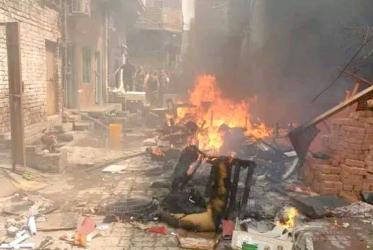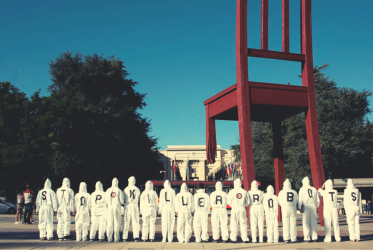Report of the WCC Consultation oraganized in collaboration with the Latin American Council of Churches (CLAI) and in partnership with Viva Rio, Rio de Janeiro, Brazil, 25-28 July 2000.
The Latin American ecumenical consultation on small arms calls on churches to renew their commitment to addressing, as a matter of urgency, the problems of violence in Latin American society and, in particular, to addressing issues of armed violence and the diffusion and misuse of small arms in their societies.
The meeting, involving representatives of churches throughout Latin America, as well as representatives of the churches and civil society in Latin America and beyond, noted with gratitude the increased international attention to the global small arms problem. Participants called on the international community, including governments, civil society and churches, also to address the conditions that lead to violence, especially the global diffusion of small arms and light weapons. Participants pledged to work within local, national, regional and international contexts, ecumenically and in cooperation with other elements of civil society, to build awareness of the United Nations Conference on Small Arms in 2001 and to promote measures designed to advance international commitment and cooperation towards the effective control of firearms, small arms and light weapons.
The meeting was organized by the World Council of Churches (WCC) in cooperation with the Latin American Council of Churches (CLAI) and Viva Rio, a local NGO, as part of their joint effort to give priority to issues of micro-disarmament within the context of the Decade to Overcome Violence: Churches Seeking Reconciliation and Peace (2001-2010) and to facilitate and encourage the churches' ongoing attention to the small arms problem. Participants noted with appreciation the leadership of the World Council of Churches in the efforts of international civil society to curb the supply and misuse of small arms and to reinvigorate efforts to build the kinds of social, economic, and political conditions conducive to sustainable human security and to reducing the demand for small arms.
The consultation welcomed the Antigua Declaration of June 29, 2000 on the proliferation of light weapons in Central America and commends it, including the policy recommendations, to governments and civil society throughout Latin America. Churches are encouraged to refer to the Antigua Declaration in the context of developing policy proposals relevant to the 2001 UN Conference.
Small Arms and Violence in the Latin American Context
The consultation heard from scholars and researchers from all of the subregions of Latin America (the Southern Cone, the Andean sub-region, and Central America and Mexico). The information and analyses presented on small arms issues in Latin America indicate the profoundly disturbing presence, spread and impact of armed violence in Latin American societies. Small arms diffusion affects regional and sub-regional stability as well as national crime rates. Latin America, the gathering was told, is burdened with extraordinarily high rates of homicide by international standards. As one participant put it, "Crimes that once shocked us are now only statistics."
While parts of the region, notably Colombia, have high rates of crime that are closely linked to entrenched political conflict, in Latin America generally the small arms problem is very closely linked to, and manifest in, drug trafficking, other crimes and desperate local social and economic conditions.
Arms production facilities within the region contribute to the diffusion of small arms and, in addition, the region has a legacy of large stocks of weapons, accumulated during the Cold War period, which now circulate within countries and throughout the region. Peace agreements in Central America for the most part failed to make effective provision for the collection of surplus guns, and the current lack of coordination of national gun control policies mean that illicit trafficking is widespread.
The consultation addressed the wide variety of factors that contribute to current high levels of armed violence, noting particularly the process of rapid urbanization as well as social and economic marginalization. Economic inequality in and exclusion from the international economy are also significant in producing the desperate social and economic conditions in urban communities that provoke a demand for guns in Latin America.
While the demand for small arms is generated through a broad range of social, economic and political circumstances, it is in local communities that it finds its most immediate expression - on the streets of urban slums, where guns are all too often viewed as a personal solution to endemic and systemic social and economic disintegration. The consultation emphasized that in Latin America, as elsewhere, the reduction of armed violence and especially the reduction of the availability of guns requires a reduction in the demand for guns, which in turn requires real social and economic transformation, in local communities and beyond.
Responding to the Small Arms Crisis
A first step towards mobilizing an effective response to the small arms crisis in Latin America must be a two-fold acknowledgement: first, that the crisis exists and that, while it has complex roots, it has deep local manifestations that must be addressed at the local level; and second, that effective attention to the problem at the local level is aided by international initiatives designed to address the small arms problem at a global level.
The consultation noted that while the solutions must be local, attempts to forge international norms and standards for restricting weapons transfers, possession and use are essential to setting a constructive context for local efforts. Thus the consultation welcomed in particular the adoption by the Organization of American States (OAS) in 1997 of the Inter-American Convention against the Illicit Manufacturing of and Trafficking in Firearms, Ammunition, Explosives, and other Related Materials. The convention commits states in the region to introduce a wide range of gun-control measures and to pursue regional cooperation towards more effective controls on the transfer, possession and use of small arms.
Similarly, the consultation welcomed current efforts to broaden and extend key provisions of the OAS convention through negotiations within the United Nations towards a Protocol against the Illicit Manufacturing of and Trafficking in Firearms, Their Parts and Components and Ammunition, supplementing the United Nations Convention Against Transnational Organized Crime. Once agreed, this Firearms Protocol will establish common international standards and promote international cooperation in their application with regard to weapons transfers. As such, it will facilitate more effective tracing of firearms.
The consultation also welcomed the forthcoming (in 2001) United Nations Conference on the Illicit Trade in Small Arms and Light Weapons in all its Aspects. This conference promises to be a major opportunity for the international community to further advance international norms and standards for effective control on the transfer, possession and use of firearms.
The consultation endorsed the initiative of the Nobel peace laureates to promote an International Code of Conduct on international arms transfers as a key element in the effort to restrict weapons flows and to encourage and establish international norms and standards against firearms possession and use.
In welcoming these international initiatives as well as initiatives in other regions, the consultation affirmed the importance of encouraging international values and norms in support of the effective control of small arms, and called for the prominent engagement of civil society and especially the churches in efforts to support and strengthen these initiatives. The churches in Latin America are urged to encourage their governments to ratify and implement the OAS convention, to support negotiations on the UN Protocol to promote the most effective controls possible, and to participate in the 2001 conference.
The consultation emphasized that, despite welcoming regional and international efforts, much more needs to be done to implement genuine hemispheric cooperation in support of gun control. Policy coordination in response to the small arms crisis has lagged far behind economic coordination and integration in the region.
The consultation identified a range of additional policy measures that should be taken by governments within regional and national contexts. Three sub-regional working groups developed policy measures relevant to each of the sub-regions, with the Southern Cone group paying particular attention to legislative measures, including current efforts to ban the possession and commerce of firearms in Brazil, as well as the need to strengthen inter-state cooperation in law enforcement measures on the sub-regional level within the Mercosur integration context. The Central American group focused on public education and advocacy measures, while the Andean group addressed national policy and legislative issues as well as public awareness-raising programmes.
Prominent among the measures discussed is the need for reform of security sectors. The consultation expressed concern about the "re-militarization" and the "para-militarization" of security and security forces. Of particular concern is rapid growth in the use of private security firms, with serious implications for national sovereignty in some instances, and with far-reaching consequences for states' and citizens' full enjoyment of natural resources, human rights, and self-determination. The consultation called for the reassertion of publicly accountable security institutions under the direct authority of states. In addition, states are called on to address problems of corruption within police forces, and to encourage the modernization of police training and procedures, including the establishment of special units within police forces to deal more effectively with domestic and family violence.
While the consultation acknowledged that addressing the root causes of the social and micro-conflicts that generate the demand for firearms in Latin American societies is a slow and arduous process, it recognized that such efforts are necessary and central to effective and long-term firearms control and to the reduction of armed violence. At the same time, the pursuit of gun control cannot wait until entrenched social and economic problems are successfully dealt with. Gun control must be pursued immediately and urgently, even in the context of ongoing social and economic disintegration. Indeed, the consultation asserted that measures to control firearms are themselves important for social reconstruction and creating cultures of peace.
The consultation urged that in all measures to control firearms and promote social and economic conditions conducive to peaceful communities, human security values, community empowerment, mechanisms for the peaceful resolution of conflict, and post-conflict peacebuilding must become central strategies and commitments.
The Role of Churches
The problem of armed violence and the diffusion of small arms in Latin America cannot be effectively addressed without the involvement of the churches of the region. The consultation encouraged the churches to acknowledge their responsibility to engage directly in public policy dialogue and advocacy. In that engagement the church must also work with other sectors of society. Churches have a special responsibility to bring central moral and ethical perspectives to bear on the social and political pursuit of microdisarmament.
In the course of addressing issues of armed violence, peacebuilding must become a central, active and strategic focus of the mission of the church. And within that mission, small arms control must be held up as an urgent objective requiring the active witness of the church.
The church was urged to train leaders within the community to give prominence to small arms issues and to build a broad capacity within the church to enable it sustain its presence both in policy development (at local, national, and international levels) and in direct community action and peace-building.
The consultation pointed to the Decade to Overcome Violence: Churches Seeking Reconciliation and Peace (2001-2010) as providing the churches with an essential framework for coordinated action, at local to international levels. In this context, a broad range of church action was discussed and recommended.
Churches have deep roots in local communities and thus are especially well positioned to address the issues of micro-conflict. Churches know the people's needs, and can understand the insecurities that lead some to seek security through guns. It is important that the churches directly connect their work to communities' needs, seeking to create gun-free zones in which the resolution of conflicts can be more constructively pursued. The consultation learned about the WCC "Peace to the City" Network, and envisioned participation in networks of cities where churches are active in addressing issues of armed violence and gun control.
The church has a calling to stand in solidarity with persons and communities which are subject to ongoing violence. Solidarity action includes the development of campaigns that mobilize citizen participation and promote the entrenchment of cultures of peace.
The churches are also well positioned to give leadership in efforts to raise awareness of the nature and extent of the small arms problem and of the urgent need for gun control measures. The gathering and dissemination of reliable information is essential, and churches were encouraged to support research efforts within civil society and the academic community, including research on issues such as the magnitude of gun availability and the physical and psychological consequences of gun proliferation. The consultation emphasized the role of the media in shaping public knowledge and attitudes and encouraged engagement with the media in explorations of responsible media coverage of violence and small arms issues.
Churches belong to a major international fellowship, and churches in Latin America are encouraged to become part of the already initiated Ecumenical Network on Small Arms (ENSA). ENSA links to the International Action Network on Small Arms (IANSA) and through these and other relationships, the churches of Latin America are urged to work ecumenically and cooperatively with civil society organizations and research institutions.
Consultation participants were moved by the tragic realities of gun violence, and yet they concluded the Rio meeting energized by the knowledge that their work to address the small arms problem is carried out in the context of a growing international community of concern and action. In summing up the consultation's call for decisive and sustained church action, participants decided the call could be boiled down to one clear assertion: "IT'S TIME FOR THE CHURCHES TO SAY NO TO GUNS."



